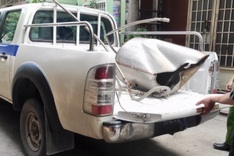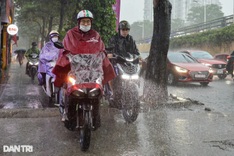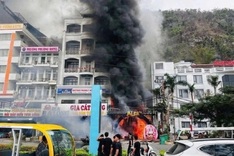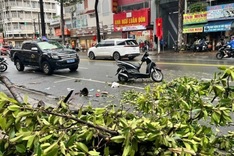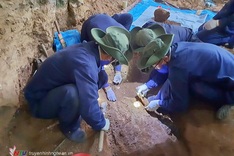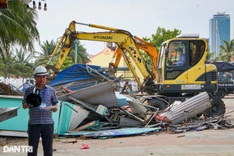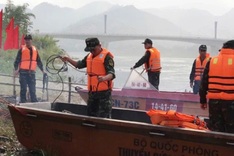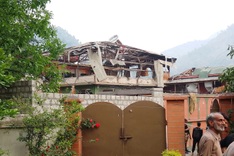>> Part 1: The grasshopper versus the elephant
>> Part 2: Tunnels and trenches
>> Part 3: The battle of Dien Bien Phu
>> Part 4: Bleeding the elephant
>> Part 5: Those are hills with a strong burning smell
On May 3, Cogny suggested to de Castries a way out with a plan called “Albatros”. Most French commanders had lost the will to continue with the battle. General de Castries refused to take the escape route and was determined to stay with his wounded men until the end. For him, military honor depended on saving the lives of his surviving troops and minimizing their suffering.
 |
| Viet Minh’s victory at Dien Bien Phu |
 |
| French troops retreat from Dien Bien Phu |
 |
| French troops surrender at Dien Bien Phu |
 |
| Viet Minh troops following victory at Dien Bien Phu |
While coping with the large number of deaths and injuries, de Castries was also faced with the intense frustration of shortages of ammunition, food and essential medical supplies. Parachute reinforcements were not reliable but he also had serious problems with the French administration. During the rainy evening of May 4, while Huguette was under heavy bombardment by Viet Minh artillery, de Castries sent a desperate message to the French headquarters in Ha Noi:
"We don’t have enough ammunition to stop enemy attacks or the continued harassing fire. It appears that no effort is being made to remedy this situation. I am told of the risks to the aircrews, but every man here runs infinitely greater risks – there cannot be a double standard. Night supply drops must begin at 8pm instead of 11pm. The morning hours are lost because of the fog, and due to the planning of night drops with long intervals between air- craft, the results are ridiculous. I have absolute need of provisions in mass quantities.
"…I cannot count on recovering even half of what is dropped, although the quantities sent to me represent only a very small proportion of what I have requested. I have nothing to sustain the morale of my men, who are being asked for superhuman efforts; I no longer dare to go and see them with empty hands."
Severe thunder storms added to this final week of misery. The cumulative effect of bombardment and flooding had turned the ground into a series of swamps filled with trash and corpses. Their new enemy - the mud - was now up to knee level. As described by a Viet Minh soldier:
Those are hills with a strong burning smell
Dead bodies are piling up on the ground
Half-buried in clumps of red mud
Rain! Heavy rain is still pouring …
A number of service wives were present at Dien Bien Phu. One woman gave birth to a baby girl on May 4, inside the bunker of the temporarily re-gained Isabelle outpost. Her wounded husband, Captain Desire, was lying nearby with a group of wounded men. The child was named after one of the outposts and baptized by the Reverend Tissot. Outside the bunker, the monsoon downpour continued and would turn into a violent storm the next day. That night, thirty-two men went on patrol out of Isabelle, heading west. All were ambushed by the Viet Minh.
Two American C-119 crews led by James McGovern had volunteered to fly a low-altitude ammunition drop over Isabelle. On the morning of May 6, under a clear blue sky and warm sun, they arrived over Dien Bien Phu. Viet Minh troops on the grounds were ready to shoot them with anti-aircraft guns. The first plane piloted by Art Wilson was hit in the tail boom. Wilson lost control but managed to escape and landed safely in Cat Bi. McGovern’s plane was hit in the port engine and he lost control, then a second shell struck its tail. Both McGovern and his co-pilot were killed by the explosion of the ammunition they had loaded inside the aircraft.
A crucial action for Giap in the final days was the attack on a strongpoint near the left bank of Nam Rom River that protected the central command post. Of their forty-nine strongpoints, this one was seen by the French as ‘the throat of Dien Bien Phu’ and it had been the scene of enormous casualties on both sides. Giap had discovered that the French access to this hill was via a fortress constructed many years earlier. The Viet Minh tunneled towards it for sixteen days, reached the site at eight-thirty in the evening of May 6, set charges for nine-thirty, and blew it up with a huge quantity of dynamite. This single explosion was louder and more destructive than any in the battle previously. Before midnight, the Vietnamese gained complete control of this strongpoint. Their waiting army from the trenches then started marching up along the slopes to the last hill.
Early Friday morning, May 7, Viet Minh troops raised their red flag with its gold star above General de Castries’ command bunker. In the afternoon Colonel Langlais went to his dugout and burned his red paratrooper beret. He exchanged it for the hat of an infantryman. Meanwhile, General de Castries telephoned his wife in Paris with a brief message, “Do not worry. I’ve already been taken prisoner. We will see each other again.” However, Cogny spoke to de Castries over a radio link from Ha Noi and instructed him not to surrender.
“Old boy, it has to finish now; but not in the form of capitulation. We are not allowed to do that. There mustn’t be any raising of the white flag. The firing must be allowed to die away – but don’t surrender. Don’t mess up what you’ve done.”
“All right, General. My wish is to protect the wounded,” answered de Castries, in tears.
Cogny went on, “ I haven’t the right to authorize you to make this capitulation. Do whatever’s best. But this mustn’t finish with a white flag. Do you understand, old boy?”
“All right, General.”
“Au revoir, old boy.”
From late afternoon to evening of May 7, more than 10,000 starving men in tattered clothes and rotten boots slowly emerged from the deep valley. The Viet Minh ordered them to march to prison camps several hundred kilometres away. Many couldn’t. They were physically too weak. They formed staggering queues heading to the hospital, where they soon collapsed. Dr Grauwin ordered his staff to get into proper uniforms with Red Cross armbands and continue with their duty. Most of the survivors were disoriented due to prolonged bombardment.
In fifty-six days of fighting, the French lost 2,748 men in combat. At the battlefield, the Red Cross counted 4,436 wounded and of these 429 died shortly afterwards. More than 3000 men had deserted during the battle.
Vietnamese losses were much higher, with 8,000 killed and 15,000 wounded. This reflected the disparity in tactics, military technology, and wealth. The Vietnamese would be willing to pay any price to liberate their country. As Ho Chi Minh had said before the battle, “You can kill ten of my men for every one I kill of yours. But even at these odds, you will lose and I will win.”
To celebrate their victory, the Viet Minh army went on marching and singing songs. The poet To Huu composed the following poem:
Oh! The two words Compatriots and Homeland
Finally they are back in our hands
One century of a lost nation
Now I can return to smiling and singing
The battle of Dien Bien Phu symbolized decisively not just the end of France’s colonialism in Indochina but also the end of centuries of European colonialism worldwide.


